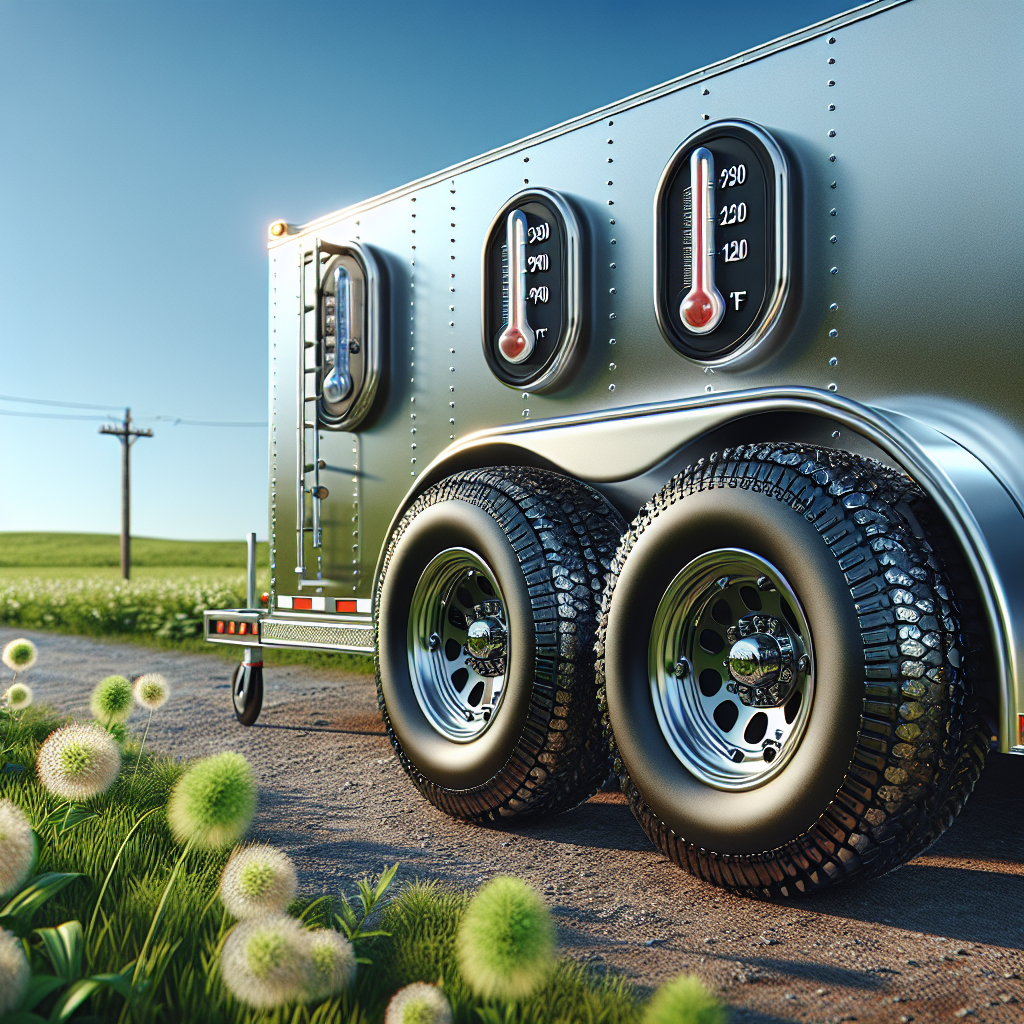Maintaining a safe trailer tire temperature is crucial for ensuring the longevity and performance of your trailer. When towing, the tires are subject to various stresses and heat can build up quickly, leading to potential failures. Understanding the optimal temperature range for trailer tires can help prevent blowouts and enhance safety on the road.
The general consensus for safe tire temperatures ranges from 90°F to 120°F when the trailer is in operation. However, this can vary based on factors such as load, tire type, and road conditions. It's essential to regularly monitor tire temperatures, especially during long hauls or hot weather conditions.
To maintain a safe trailer tire temperature, consider the following tips:
- Check tire pressure regularly. Proper inflation helps prevent overheating.
- Avoid overloading your trailer, as excessive weight can increase heat generation.
- Inspect tires for wear and tear, as damaged tires are more prone to heat issues.
- Utilize a tire monitoring system to keep track of tire temperatures in real-time.
By actively managing your trailer's tire health, you can prevent catastrophic failures and ensure a smoother journey. Tow with peace of mind, knowing that trailerwatchdog is standing guard.
Why Tire Temperature Matters for Trailers

The temperature of your trailer tires plays a significant role in overall safety and performance. An understanding of why tire temperature matters is essential for any trailer owner. High tire temperatures can lead to a range of issues, including reduced traction, increased wear and tear, and ultimately, catastrophic tire failure.
When tire temperatures rise beyond the recommended range, several problems can occur:
- Blowouts: Excessive heat can weaken the tire structure, leading to sudden blowouts that pose severe risks to both the vehicle and surrounding traffic.
- Poor Handling: Hot tires can alter the handling characteristics of your trailer, making it more challenging to steer and control.
- Decreased Fuel Efficiency: Overheated tires create more rolling resistance, which can lead to reduced fuel efficiency and increased operational costs.
- Premature Tire Wear: Elevated temperatures accelerate the degradation of tire materials, resulting in the need for early replacement and added expenses.
Understanding these risks underscores the importance of monitoring tire temperatures. By maintaining them within the safe range, you not only enhance safety but also ensure better performance and longevity for your trailer. Proper tire management can save you from unexpected breakdowns and costly repairs, making it a crucial aspect of trailer maintenance.
Optimal Temperature Range for Trailer Tires

Establishing an optimal temperature range for trailer tires is vital for ensuring safe and efficient operation. Generally, the ideal temperature for most trailer tires falls between 90°F to 120°F (32°C to 49°C). Staying within this range helps maintain tire integrity and performance.
However, several factors can influence this optimal range:
- Load Capacity: Heavier loads can lead to increased tire temperatures. Therefore, it is essential to monitor tire temperature closely, especially when towing near the maximum weight limit.
- Weather Conditions: Hot weather can naturally raise tire temperatures, while cold weather can make them too cool. Adjusting your driving habits and monitoring tire pressure can help mitigate these effects.
- Speed: Higher speeds generate more heat. Maintaining a moderate speed can significantly help in keeping tire temperatures within the safe range.
- Tire Pressure: Properly inflated tires are crucial for temperature control. Under-inflation can lead to higher temperatures, while over-inflation can negatively affect performance.
Regularly checking the temperature of your trailer tires during trips can help you identify any issues before they escalate. Utilizing a trailer monitoring system can streamline this process, providing real-time data to ensure you stay within the optimal temperature range. This proactive approach not only enhances safety but also extends the life of your tires.
Signs of Overheating Trailer Tires

Recognizing the signs of overheating trailer tires is crucial for preventing catastrophic failures and ensuring your safety on the road. Overheating can lead to tire blowouts, loss of control, and significant damage to your trailer. Here are some key indicators to watch for:
- Increased Tire Temperature: If tire temperatures consistently exceed the optimal range of 90°F to 120°F, it's a clear sign that something may be wrong.
- Visible Damage: Inspect your tires for signs of wear such as cracks, bulges, or blistering on the sidewalls, which can indicate overheating and a potential blowout risk.
- Unusual Noise: Listen for any strange sounds while driving, such as thumping or grinding, which may point to tire issues stemming from overheating.
- Vibrations: Excessive vibrations in the trailer can signal that the tires are not functioning properly, possibly due to overheating or tire imbalance.
- Frequent Pressure Loss: If you notice a rapid decrease in tire pressure, it could be a result of overheating, causing the tire structure to weaken.
If you observe any of these signs, it is essential to pull over safely and inspect your tires. Allow them to cool down before checking for damage or consulting a professional. Implementing a monitoring system can help you stay ahead of potential issues, providing valuable data to prevent overheating before it becomes a serious problem.
Effective Ways to Monitor Tire Temperature
Monitoring tire temperature is essential for maintaining optimal performance and ensuring safety while towing. Here are some effective ways to monitor tire temperature:
- Tire Pressure Monitoring Systems (TPMS): These systems provide real-time data on tire pressure and temperature, alerting you to any abnormalities. A TPMS can help prevent overheating by notifying you when tire temperatures rise beyond safe levels.
- Infrared Thermometers: A handheld infrared thermometer can be a quick and effective tool to check tire temperature manually. Simply point the device at the tire surface to get an instant reading, allowing you to identify any hot spots that may indicate potential issues.
- Smart Tire Sensors: Many modern tire monitoring solutions come equipped with smart sensors that can be installed directly on the tire valve stems. These sensors continuously monitor tire temperature and send data to a mobile app or display, providing you with instant updates.
- Regular Inspections: Conducting routine visual inspections of your tires is crucial. Look for signs of uneven wear, damage, and overall condition. Incorporate tire temperature checks into your regular maintenance routine to catch any problems early.
- Data Logging Systems: Advanced data logging systems can provide comprehensive insights into tire performance over time. These systems can track tire temperature fluctuations during your trips, helping you make informed decisions about maintenance and repairs.
Incorporating these methods into your regular maintenance practices will help you keep a close eye on your trailer tires, ultimately enhancing safety and performance on the road.
Tips for Maintaining Safe Tire Temperatures

Maintaining safe tire temperatures is vital for the longevity and performance of your trailer tires. Here are some essential tips for maintaining safe tire temperatures:
- Regularly Check Tire Pressure: Ensure that your tires are inflated to the manufacturer’s recommended pressure. Under-inflation can lead to increased heat generation, while over-inflation can cause uneven wear.
- Monitor Temperature During Use: Use a TPMS or infrared thermometer to keep an eye on tire temperatures, especially during long trips. If you notice a sudden increase, pull over and inspect for potential issues.
- Avoid Overloading: Check the load capacity of your trailer and avoid exceeding it. Overloading can cause excessive heat buildup in tires, leading to blowouts or other catastrophic failures.
- Maintain Proper Alignment: Ensure that your trailer is properly aligned. Misalignment can cause uneven tire wear and excessive heat, compromising safety and performance.
- Rotate Tires: Regularly rotating your tires can help ensure even wear, which can contribute to maintaining consistent tire temperatures. Follow the manufacturer’s recommendations for rotation intervals.
By implementing these practices, you can help keep your trailer tires in optimal condition, preventing failures and enhancing safety. Tow with peace of mind, knowing that trailerwatchdog is standing guard. Visit us today!

